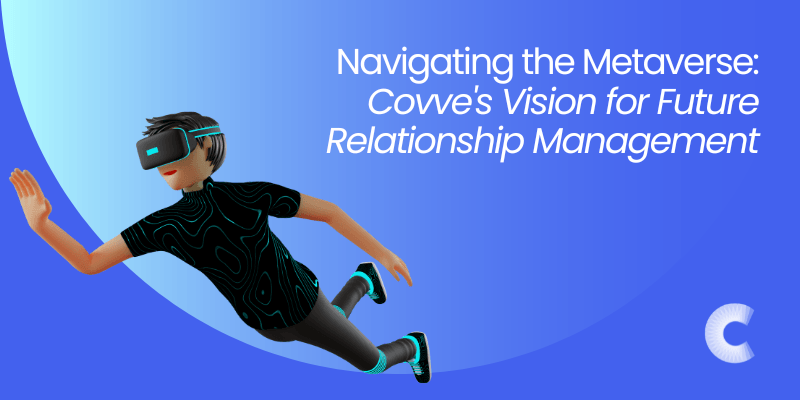
The ways in which we connect have drastically changed over the past few years. From the advancement of smartphones to video conferencing, social media, and now, the metaverse. The metaverse is a virtual space that enables people to interact with one another, regardless of their physical location.
To better understand how the metaverse may impact forming relationships, Joseph Raczynski, who delivers technological intelligence on future trends, hosted Covve’s CEO, Yiannis Gavrielides for a discussion.
The discussion primarily focused on the impact of online versus offline interaction, and the ability of each ‘realm’ to support and foster one’s ability to network effectively.
On one hand, networking relies on trust and interpersonal relationships, which are best achieved in person, where eye contact and body language are possible. According to Yiannis, in-person communication can be a catalyst for opportunities and new ideas; mentioning that creativity and innovation in professional settings are primarily born from spontaneous interactions; in the hallway, by the water cooler, or at events and meetings for example.
On the other hand, with today’s most frequently used technology (smartphones and PCs), we are able to connect across long distances, but the quality of the interaction is lacking. The barrier of screens hinders people’s ability to truly connect and understand each other, despite its convenience in long-distance communication.
This begs the question, can these elements, such as eye contact and body language, that are the bedrock of communication be transferred to the metaverse? To a full digital frontier?
There’s a strong belief that the introduction of the metaverse may be able to supersede screens and their barriers to interaction, where people can interact with personalized avatars. According to Covve’s research team, 60% of consumers feel that the metaverse will improve the way in which we communicate, 46% believe that body language will be aptly simulated through avatars, and 38% feel that they will be able to trust people they meet on the metaverse. These indicators showcase people’s willingness to embrace this disruptive technology as a new plane for networking and interaction.
Frankly speaking, forming relationships in digital worlds through avatars is not an entirely new concept. In their discussion, Yiannis expressed that we have already witnessed people’s capacity to interact, referring to Second Life, Massively Multiplayer Online Role-playing Games (MMORPGs), and VR Chat. However, the concurrent theme of these avatars is their anonymity, which raises questions about people’s ability to establish trust while networking.
The concern is, how will people trust that the person they are connecting with is genuine? In their discussion, Yiannis considered Soul Bound Tokens (SBTs) whitepaper, and how SBT holders may use their wallet as their “soul” within digital worlds. Through SBTs, people will be able to control the information viewed by others, as a means to verify their identity and establish trust, which is a key component to forging relationships. This gives a certain quality to people’s avatars, and how they interact.
He goes on to explain that a good balance would enable individuals to exercise sovereignty over themselves and their information. The goal is for people to be able to exist within digital worlds and move between them, retaining control over their data and how it’s used.
With the evolution of technology, it is paramount to continue to nurture relationships based on trust, and to learn to leverage technology to enhance the ways in which we connect. According to Gartner’s research, it is expected that in the near future, 25% of the world population will spend at least one hour on the metaverse.
Indeed, the future of relationships is unquestionably evolving at a rapid pace. However, we still have a long road ahead in terms of being able to simulate the qualities of physical social interactions. As pointed out in the podcast “we’re still far away from replicating what it takes to feel the social presence. If we break it down a bit, we are missing eye contact… we’re missing the touch, as well.” Therefore, in the absence of being able to replicate physical elements in a meta world, like in the film ‘Ready Player One’, we must continue to rely on real-world interaction.
Written on 13 Feb 2023.
Related Posts: